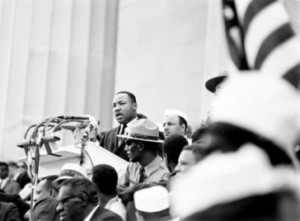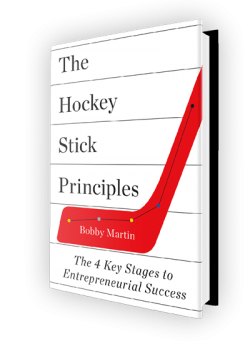I paced back and forth in my office, listening on speakerphone as sales and middle managers were grilled or praised by the boss. After an hour of this, I shifted my energy to staring out the window at the pedestrians below. Soon I’d have my turn to face the music.
Like many other large-company managers across the country, I despised the process of sales “commitment” (a.k.a., goals) roll calls. My business unit had missed our commitment a few weeks in a row, and the boss’s patience had run out. You have to picture the scene – several people were on the call, silently enjoying the show and thinking, “I wonder how Bobby’s going to talk his way out of this?”
When it was my turn in the hot seat, I actually used the word that gets the weak fired and the lame hunted down and killed in American business. The executive asked, “Bobby, I need your commitment. Will you get the results by the end of the week or not?”
And then I said it – I used the riskiest, baddest word of all: “I HOPE so.”
You could cut the tension with a dull knife. The boss barks, “Bobby, ‘hope’ is not a strategy. Are you going to get the results or not?”
“I just don’t know. But I’ve built my entire career around hope.” My answer, though honest and straight from the heart, didn’t go over well, and the shit hit the fan.
Hope isn’t a popular word in big business, and you may agree with my former boss that hope is indeed no strategy. Businesses don’t pay people to sit around and hope things happen. We get paid to develop plans and meet objectives. “Hope is not a strategy” has kind of a commanding ring to it, doesn’t it? It implies the speaker is strong and the listener is feckless and weak. The phrase insinuates that, “You’re not capable of succeeding because you only hope things will happen. You must lack the ability, drive, and work ethic to get this job done.”
How did hope get such a bad rap?
When did hope get lost as the virtue it really is? Have we become hope-less? Well, take a look at who attracts all of the attention in American business. Today, Wall Street titans of industry set the tone. Results-driven, hope-empty philosophies sound decisive and powerful; everybody wants to be like that. Thus these messages leach throughout society by our mighty media and word of mouth. Soon we begin to believe that these unrealistic, simplistic, brittle ideas and practices are the formula for success in entrepreneurship, too. Hope is only an emotion, a poor, pesky throwback to the early twentieth century or before.
But is hope a hopeless strategy for entrepreneurs…or the rest of us for that matter? Does our hope reveal our weakness as we open and run a small business? Or can hope actually make us more successful–and happier as we are becoming successful?
Hope is more than a strategy
The world is more complex than big-business America, whose incentives are primarily driven by the accumulation of wealth. This central emphasis on accumulating assets is totalitarian, fundamentalist, and simplistic, thus weak. Any system of thought and action that takes its energy from one idea—to get rich and stay rich—can be toppled easily, too easily to put your faith into. Better to trust yourself. To feel hope and to use it in the service of your own true work.
And this is where entrepreneurship comes in.
The real world is humble and understands that we don’t fully comprehend the human race, the depths of the human heart. We simply can’t know what will happen tomorrow. While we may attempt to control the future, we often fail. The future is, of course, a lot like the past, only more so, as the Bible tells us. But it’s also determined by thousands of variables beyond individual or corporate and governmental control. We can hope only to influence the future in a small way.
Thus, hope is vital because it strengthens our weakest link in human existence –– lack of control over the future.![]() Tweet this Hope fuels the ability to act upon our desires. Hope is therefore a strong, positive emotion as it aids all enterprises, especially entrepreneurial ventures.
Tweet this Hope fuels the ability to act upon our desires. Hope is therefore a strong, positive emotion as it aids all enterprises, especially entrepreneurial ventures.
Human beings, including entrepreneurs, fundamentally need hope because we live in an imperfect world.![]() Tweet this Two of the greatest speeches ever given remind us that hope is much more than a strategy.
Tweet this Two of the greatest speeches ever given remind us that hope is much more than a strategy.
 Martin Luther King – “I Have a Dream” speech, August 28, 1963, Washington, D.C.
Martin Luther King – “I Have a Dream” speech, August 28, 1963, Washington, D.C.
“I have a dream that one day ‘every valley shall be exalted, and every hill and mountain shall be made low, the rough places will be made plain, and the crooked places will be made straight; and the glory of the Lord shall be revealed and all flesh shall see it together.’
“This is our hope, and this is the faith that I go back to the South with.
“With this faith, we will be able to hew out of the mountain of despair a stone of hope.”
_______________________
John F. Kennedy — Inaugural Address, January 20, 1961, Washington, D.C.
“To that world assembly of sovereign states, the United Nations, our last best hope in an age where the instruments of war have far outpaced the instruments of peace…”
Try to imagine someone interrupting Martin Luther King during his “I Have a Dream” speech: “Excuse me, Dr. King? I hate to interrupt you because clearly you’re on a roll, but hope is NOT a strategy!”
That’s so off course it’s comical. Hope had deep meaning in his speech: it resonated in the hearts and minds of all who heard it. Hope was persuasive, uniting all listeners to positive, creative action for change.
For Dr. King, hope was not a strategy, hope was everything.
Most entrepreneurs hit a point after about a year when their “plan”–their carefully constructed “strategy”–begins falling apart. “Where are the customers? Why can’t we break even financially? I’m tired of living with no income. My wife/husband is freaking out! My heart was in this, but now I’m losing faith.” It’s at this point when hope is all we have. Hope is strong for us because hope is the last to die. Hope raises our tattered, smoke-scorched flag above the battlements and waits staunchly, silently for reinforcements – which turns into action – and eventual success.
Sign up to get more great insights directly to your inbox.
As a special bonus, you'll also immediately get access to my inside analysis of what made 172 diverse companies achieve take-off revenue growth.
